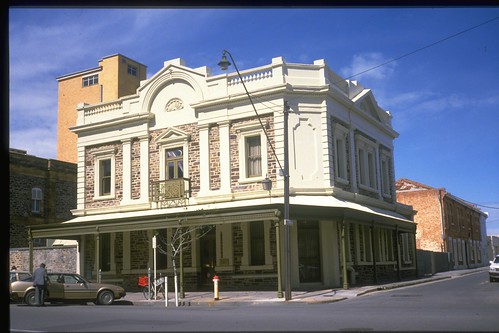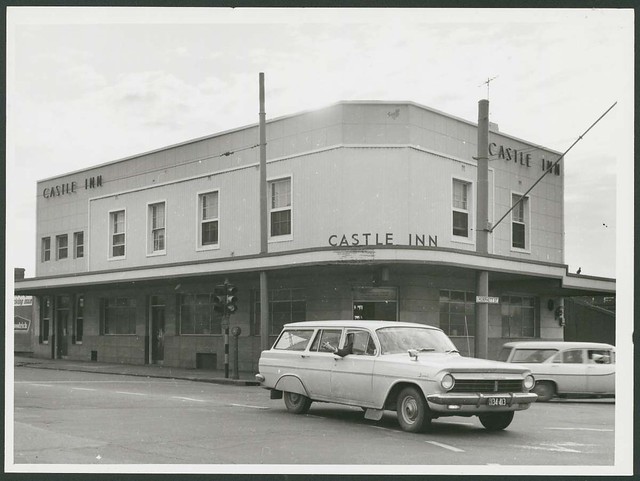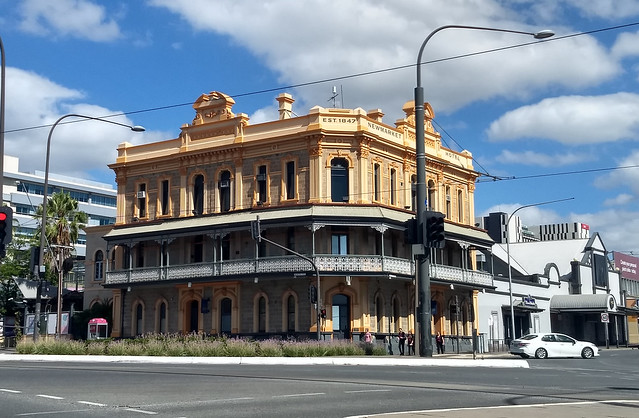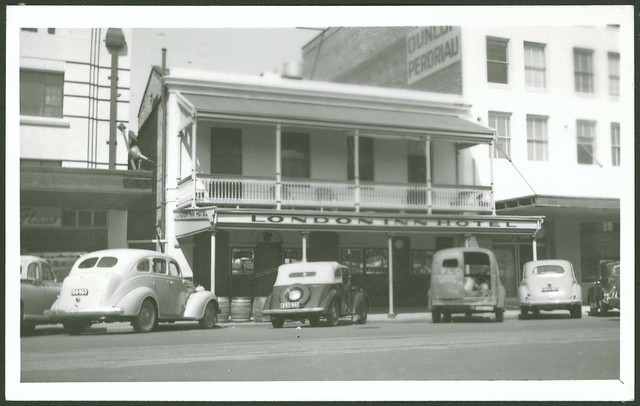And for some pubs it may be the last time
Story by Max Fatchen from Saturday Magazine 30 May 1970
Photos added from various sources as cited
The bar of the doomed 116-year-old Supreme Court Hotel was quiet. A couple of legal men drank peacefully. A man wanted to argue about the election.
"Thursday June 4 we close for good," said the manager Mr. George Grahame unemotionally.
[Editor's Note: The pub died, but the building was saved https://maps.app.goo.gl/6UZaVx6pafwCZfpVA]
For change is change and the hotel will give way for development of the State Courts building just as the Hotel Adelaide closed in April for city redevelopment.
Progress has taken its toll of familiar pubs. The AMP's impressive new building soars on the site of the Gresham, the offices building of Craminster Properties Pty. Ltd., towers on the site of one of Adelaide's oldest hotels, the Exchange.
The Imperial, which once had one of the biggest city beer trades, its bars a roaring hubbub before clients went to catch the so-handy trams, is no more. The National Mutual building has replaced it.
The Castle Inn, which closed in 1966, gave way to the New Morphett Street bridge. In 1962 The Tavistock, at the other side of the city proper, succumbed to road improvement.
The Oriental on the corner of Rundle Street and Gawler Place has become the Walsh Building and headquarters of the Lotteries Commission of SA.
Since 1953 other city hotels which have closed include the Prince Alfred, Windsor Castle, Red Lion, Star and Garter, John Bull, Hotel Langham, Bucks Head, Oakfield and the London Inn.
The smaller hotels in other parts of the city proper have felt the change. Many small houses near them have been demolished and regulars who lived there have gone. Loyal drinkers still stick to their pubs.
But the new suburban hotels with their showbiz entertainment, their large parking areas and the fact that the breathalyser has made many people cautious about their drinking, which they'd prefer to do near home, has also drawn off city clientele.
RELATED: Adelaide's Historic Hotels and Pubs
Later closing hours with more lel- surely drinking has been a factor.
But city hotels have taken up the challenge and have often dramatically altered their premises. There has been a minor revolution in decor and facilities.
Behind even modest facades you'll find elaborate lounges, dining rooms with swinging decor, smorgasbords and of course the counter lunch, all of which attract customers.
There are now 75 registered hotels in the city area and in 1950 there were 91. In 1861 there were about 110 hotels, and in the hard-drinking 1840s when Adelaide's population reached 6,600, there were 63 pubs averaging about a public house to every 105 residents.
There has always been a big concentration along Hindley and Rundle Streets on the traffic route from Port Adelaide. There were 27 hotels in the two streets in 1861. Now there are about 14.
If the roll call of historic pubs is dwindling, some have teetered on the brink of demolition and then made a swinging comeback. One, The Newmarket, standing on one of the most impressive sites in Adelaide, overlooking the parklands the road to the Port.
Among other things that have revived the hotel's popularity have been the demolition of near nearby buildings for a car park and of course the smorgasbord and the businessmen's lunches. There are also historical attractions.
With licensee and manager, 22-year-old Mr. Fos Wilson and his father, Mr. Vic Wilson, I walked up the spiral staircase of English Cedar.
"The staircase supports itself," said Mr. Wilson, "not a nail or screw in it. The tourist buses even stop here so that people can see it."
The Newmarket has a voluptuous air with its stained glass skylights and its opulent mirrors. The hotel also claims the birth of the term "butcher" for a small glass of beer, because the butchers at a market opposite dropped in for a quick one and always complained that the glasses were too big. So a glass was evolved to suit them.
There were some stormy and significant meetings in the rooms of Adelaide's old pubs.
The departed Exchange was host to the Corn Exchange Committee in 1843 when it considered plans for a reaping machine, one upshot being the appearance of Ridley's famous stripper.
The hotels have been targets for demonstrations, particularly in the latter part of last century when these "temples of Bacchus" with their 11 p.m. closing were condemned by church groups and militant women's organisations.
There were marches and the inevitable banners "Will you vote for bar or baby?" "Wipe out drink and give us happy homes."
The "Wipeout" came with World War I when legislation limiting trading hours was passed,
Today there's a more sophisticated air about many city hotels. The traditional old pubs continue but some of them are quiet.
Some still have loyal and lively customers. Ex-Commando Alick Ward has been a customer at the Earl of Aberdeen by Hurtle Square since he came back from World War II. He feels comfortable there.
Licensee John Corcoran says that his customers are mostly workers from nearby meat and milk processing [ED: AMSCOL] factories, and also oldtimers from small nearby houses.
"Forty per cent of my customers would never go in a flash hotel," he said.particularly
But he considers the future for hotels lies in counter lunches, new facilities and entertainment, particularly for young people.
"Motels around here have taken the house trade from older hotels," he said.
There's still plenty of warmth and traditional clients in the hotels around the East End market.
 |
| South side of Rundle St outside the Stag Hotel (1921) source |
At the Stag Hotel in Rundle Street East, where, back in 1850 you could get a sumptuous, three-course meal for fid. and, at one stage, all drinks were 3d licensee Rob Lawrie is now serving counter breakfast.
The hotel opens at 4 am for marketmen. Once it opened at 5 am.
Mrs. Lena Pomeroy, of the nearby East End Market hotel, which celebrated the centenary of its licence a couple of years ago, said: "Market men have a fantastic sense of humour. They like to tease. Market mornings are busy and happy mornings."
In the flourishing Overway Hotel In Hindley Street by the Morphett Street Bridge, licensee Mr. Frank Boublik says that some of his customers are opal buyers. Mr. Boublik has been an opal gouger himself
Enterprising hotel keepers have tried many improvements.
And even air-conditioning, taken for granted today, isn't all that new. The Victoria Hotel in Hindley Street had a novel cooler in the dining room in 1872. It was a punkah, consisting of a long board to which a fringe of material was attached. The punkah was suspended from the ceiling and worked to and fro with cords by a small boy sitting nearby.
But the oldtimers who went to Adelaide's first show in Fordham's Hotel, Grenfell Street in 1841, would goggle at the historical murals and elegant decor of the Sturt Arcade Hotel which was erected on its site in 1885.
Its licensee, Mr Peter Whalin, who is also president of the SA branch of the Australian Hotels Association, feels that smaller city hotels enable a close contact between the licensee and his customers.
Mr. Whallin says that hotels are again becoming the social centre that they once were.
"And people in these surroundings don't always want entertainment and music," he said, "Very often they want conversation."
He says that city hotels are at- tracting cilents for special activities, The National Hotel in Pirie Street, for instance, is the headquarters of the Darts Association of South Australia and draws people for competition play, night after night.
But the old vanished hotels have left their stories behind them. For zeal, it would be hard to outdo the licensee of the now defunct London Inn in Flinders Street when Dunlops building caught alight next door.
He phoned the South Australian Brewing Co., Ltd exaltedly: "Send down a trolley of beer If we don't burn down, we'll sell as much in the next couple of hours as we'll sell in the next couple of years."
He didn't burn and he got his beer.
++++++++++++++
 |
| Max Fatchen (1920-2012) was a writer and journalist and for many years Australia’s best-known children’s author and poet. Read More |









